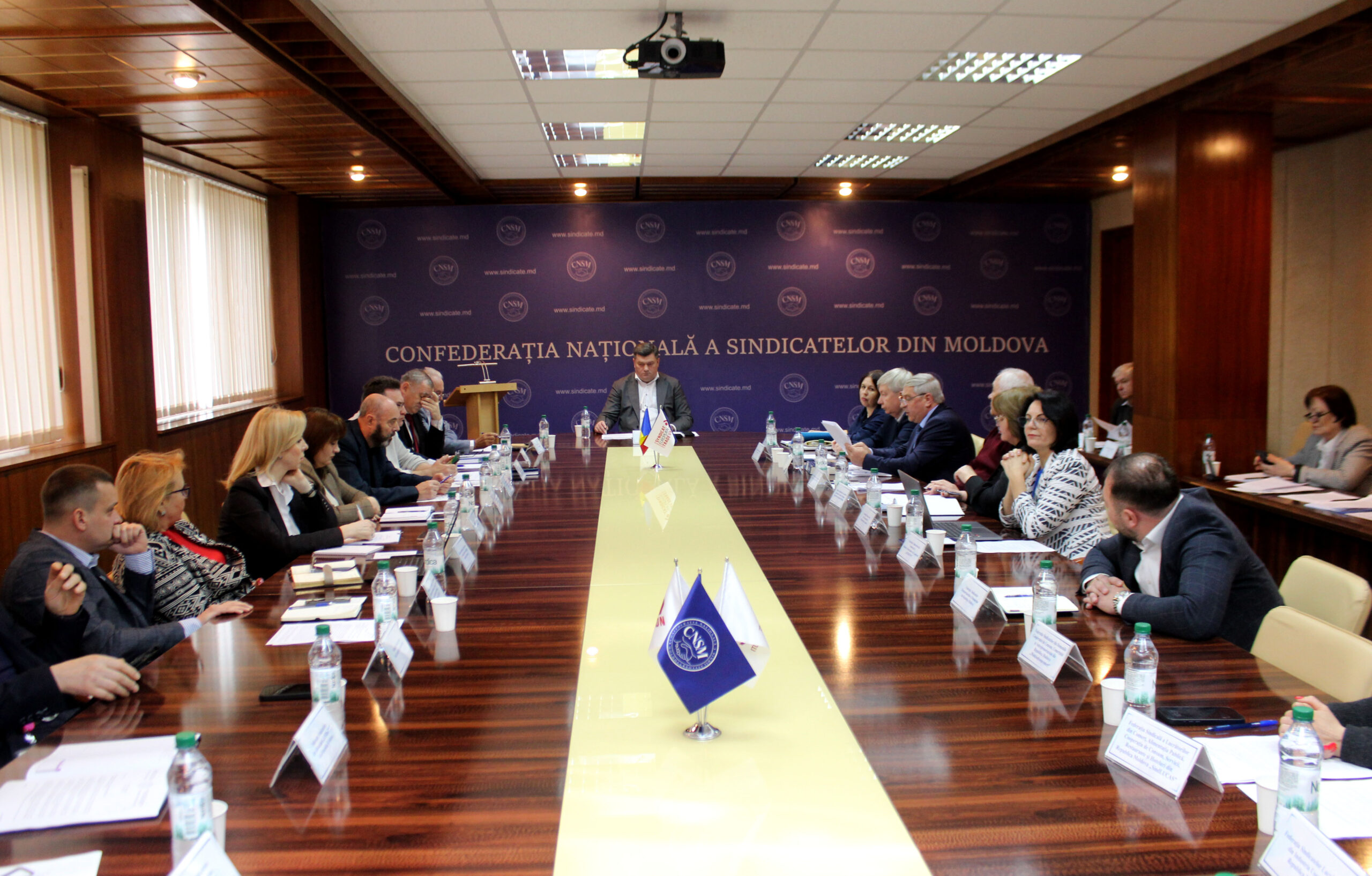The members of the Confederal Board of the National Trade Union Confederation of Moldova (CNSM) met on Thursday, February 29, in an ordinary meeting, to discuss several issues of social-economic importance, but also of an organizational nature concerning the activity of the trade union movement planned for this year.
Among the most important issues are those concerning the formulation of a proposal in the form of a draft government decision to establish the stages of reviewing the minimum wage, the initiation of the ratification process of the International Labour Organisation (ILO) Convention No. 156/1981 on workers with family responsibilities, the work of the Trade Union Labour Inspectorate in 2023.
In addition, the issues related to the convening of the meeting of the CNSM General Council, the activity of CNSM representatives in the territory during 2023, the termination of the status of CNSM representatives in the territory (Balti municipality and Calarasi district) and the confirmation of new CNSM representatives in the territory were addressed.
The trade unionists have announced that a proposal in the form of a draft government decision will be formulated to set out the stages of the minimum wage review. The CNSM proposes to establish concrete steps for the annual review of the minimum wage, so that from 1 January 2027, the minimum wage in the country will be set at 50% of the average monthly wage forecast in the economy for the previous year (as forecast).
Thus, it is proposed that the minimum wage in the country be set as follows:
– from 1 January 2025 – 43% of the average monthly wage in the economy forecast for the previous year for a full 169-hour working day (on average per month);
– from 1 January 2026 – 46% of the average monthly wage in the economy, forecast for the previous year for a full 169-hour working day (on average per month);
– from 1 January 2027 – 50% of the average monthly wage in the economy forecast for the previous year for a full 169-hour working day (on average per month).
As a result of the changes, the minimum wage in the country would be set from 01.01.2025 at 5900 lei; from 01.01.2026 – 6900 lei and from 01.01.2027 – 8130 lei.
In order to ensure an adequate level of the minimum wage, the National Trade Union Confederation of Moldova has proposed, over several years, to set it at 50% of the average monthly wage in the economy, to cover the needs of the employee and his family, in accordance with the provisions included in the European Social Charter (revised) and the EU Directive 2022/2041 on adequate minimum wages in the European Union.
Those present discussed the initiation of the ratification process of the International Labour Organisation Convention No 156/1981 concerning workers with family responsibilities. The Convention was adopted at the 67th session of the International Labour Conference on 3 June 1981 in Geneva, Switzerland. ILO Convention No 156/1981 recognises the importance of supporting workers with family responsibilities, ensuring effective equality of opportunity and treatment between men and women workers with family responsibilities and between such workers and other workers.
In connection with the work of the Trade Union Labour Inspectorate in 2023, the members of the CNSM Confederal Board were informed that during 2023 work visits were made to 275 entities with a workforce of 30443 employees, of which: 26910 – trade union members (or 88.4%) and 18775 – women (or 61.7%). During the working visits, 6443 deviations from the legal framework were found, of which 625 – in the field of labour relations (labour law) and 5818 – in the field of occupational safety and health or 90% of the total number.
Among the most frequent breaches are: lack of occupational health and safety committees; lack of necessary employee training; lack of occupational risk assessments and protection and prevention measures; failure to carry out medical examinations for certain categories of employees; lack of appropriate documentation and indicators as required by the legal framework in the field of occupational health and safety; violation of the legal framework concerning shift work; failure to comply with the provisions of individual employment contracts, etc.
At the same time, the members of the CNSM Confederal Board were informed about the work of the CNSM representatives in the territories during 2023. During the reporting period, the CNSM representatives in the territories were involved in the organisation and conduct of a wide range of activities. Thus, 57 activities were carried out with the participation of more than 2 987 trade union leaders and members in the territory.
The members of the CNSM Confederal Board have decided to convene a meeting of the CNSM General Council on 11 April 2024, in the Trade Union House, to discuss the CNSM’s actions to ensure the social-economic and legal protection of trade union members (December 2023 – March 2024) as well as other organisational matters.
As a reminder, the Confederal Board is the governing body of the CNSM between General Council meetings. The CNSM Confederal Committee defines the Confederation’s position on current national and international trade union issues; it carries out the resolutions and decisions of the Congress and the General Council, drawing up concrete action plans.

